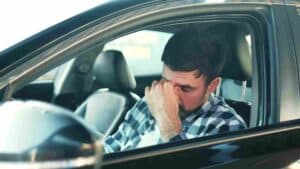Fatigued Driving Car Accident in Kokomo

When exhaustion takes the wheel, the consequences can be catastrophic. At our Kokomo office, we’ve seen the aftermath—twisted metal, shattered lives, endless what‑ifs. If you’ve been hurt in a fatigued driving wreck, we’re here to stand by you.
Vaughn Wamsley is your dedicated car accident attorney in Kokomo, committed to helping you secure maximum compensation while you focus on recovery.
Why Drowsy Driving Is a Serious Threat
Fatigue behind the wheel isn’t just “sleepiness.” It’s a cognitive impairment comparable to drunk driving. The National Highway Traffic Safety Administration (NHTSA) estimates more than 91,000 police‑reported drowsy‑driving crashes annually, resulting in roughly 50,000 injuries and nearly 800 deaths each year.
Meanwhile, the AAA Foundation suggests the actual toll is much higher: up to 328,000 crashes, 109,000 injuries, and 6,400 fatalities per year.
In Indiana alone, impaired driving—of which fatigue is classified as a type—accounts for over 29% of injury collisions involving fatalities or incapacitation. These numbers underscore the importance of a Kokomo drowsy driving accident lawyer for victims seeking justice.
The Scope of the Problem in Indiana
Indiana’s 2022 crash data shows a record-high fatality rate of 14.1 per 100,000 residents. Of those fatal crashes, many are tied to impaired driving, including fatigue.
Traffic Safety research indicates that 111,298 total accidents in a recent year were caused by unsafe driving behavior, including fatigue.
Plus, about 1,500 fatalities and 71,000 injuries occur per year due to fatigue‑related crashes nationwide—a sobering reminder that fatigue-driven crashes are not rare anomalies; they are part of a widespread safety crisis.
Understanding Indiana Law on Fatigued Driving
Indiana does not have a standalone statute labeled “drowsy driving,” but it treats fatigue within its reckless driving laws. Under Indiana Code § 9‑21‑8‑52, any driver who operates a vehicle in a manner that endangers others—such as drifting due to sleep—can be deemed reckless and face charges.
Moreover, courts have consistently held that falling asleep at the wheel constitutes negligence; even if unintentional, causing a crash due to fatigue meets the criteria for civil liability.
Common Causes of Fatigued Collisions
Several factors increase the risk:
- Shift work or irregular schedules, especially night or swing shifts;
- Undiagnosed sleep disorders like sleep apnea;
- Use of medications or alcohol that multiply fatigue;
- Long-distance driving without breaks;
- Driving during circadian low periods—midnight to 6 a.m. and late afternoon.
These conditions frequently result in lane drift, delayed reaction time, and micro‑sleeps—moments of unconsciousness that can last several seconds.
How We Help as Your Auto Accident Attorney in Indiana
When you work with us, you’re more than just a client—you’re a partner in pursuing justice. Here’s how we advocate for victims of fatigued driving crashes:
1. Immediate Investigation & Evidence Collection
- We visit the scene to track skid marks, roadway conditions, and visibility.
- We gather cell phone records, logs (especially from commercial truck drivers), medical prescriptions, and expert sleep reports.
- We obtain all official crash documents, dashcam or traffic cam footage.
2. Working With Experts
- Sleep specialists analyze whether fatigue played a role.
- Accident reconstruction experts demonstrate how micro‑sleeps or lane drift led to the collision.
- Medical professionals testify to the severity of injuries and their long-term consequences.
3. Proving Reckless or Negligent Conduct
We align evidence with Indiana law, demonstrating that fatigue is equivalent to impaired or reckless driving. Even without intoxication, drifting across lanes or hitting rumble strips under fatigue meets the threshold for liability.
4. Calculating Your Damages
We assess both economic damages (such as medical bills, vehicle repair, and lost wages) and non-economic damages (including pain, suffering, and emotional trauma). When negligence caused a violent crash, punitive damages may be available.
5. Aggressive Negotiation & Litigation
Insurance companies may minimize the role of fatigue. We challenge them with precise data and legal precedent. If we can’t settle for a fair amount, we’re ready to go to trial.
6. Patient‑Centered Communication
We keep you informed every step of the way, answer your questions, and serve as your guide through this complex process. We want you to focus on healing; we’ll take care of the rest.
Why Choose Our Car Wreck Law Firm in Kokomo
- Proven Track Record: We’ve recovered millions for clients in drowsy driving and other serious crashes.
- Local Insight: As a Kokomo-based team, we have in-depth knowledge of local courts, judges, and insurers.
- Compassionate Support: We treat every client like family, always keeping your needs at the forefront.
- No Fees Unless We Win: You pay nothing unless we secure compensation for you.
Real-Life Example: A Fatal Crash Handled with Diligence

In a Delaware County case, a fatigued driver in a Cadillac drifted across the center line and smashed into an oncoming truck. The passenger car burst into flames, killing the driver and injuring the trucker. We later uncovered evidence of a lack of sleep and no distraction, reinforcing that fatigue was the culprit.
Even in cases where the at-fault driver dies, Indiana law allows claims to be filed against the estate or the insurer.
Safety Tips to Prevent Drowsy Crashes
While we fight for victims in court, here’s how everyone can help avoid these crashes:
- Follow NHTSA guidance: get 7–8 hours of sleep, take breaks during long drives, and avoid alcohol before driving.
- Steer clear of driving during circadian low periods (midnight–6 a.m., late afternoon).
- Recognize warning signs: repeated yawning, wandering thoughts, head nods, and drifting. Pull off the road and rest or change drivers.
- Utilize road safety features, such as rumble strips, fatigue detection systems, and lane-departure warnings, to help alert drivers.
Frequently Asked Questions
1. Is fatigued driving illegal in Indiana?
Not per se—but if it results in dangerous driving behavior, Indiana classifies it as reckless under IC 9‑21‑8‑52.
2. What if the fatigued driver wasn’t arrested?
You can still file a civil lawsuit. Proper accountability comes through proving negligence based on crash evidence, not just criminal convictions.
3. How quickly do I need to act?
Indiana’s statute of limitations for personal injury is two years from the crash. Don’t delay—evidence fades, witnesses move. Contact us right away.
4. Can I recover non‑economic damages?
Yes. Compensation can include pain, suffering, emotional distress, loss of enjoyment of life, not just medical bills.
5. What if I’m partly to blame?
Indiana follows comparative fault: your compensation is reduced by your percentage of responsibility. Even if you share some blame, you can recover the rest.

How to Start Your Case
- Free Consultation: We listen to your story, evaluate the crash, and answer your questions.
- We Investigate: We collect evidence and consult experts.
- Negotiation: We seek full compensation through demands and mediation.
- Litigation (if needed): We prepare and present your case in court.
When fatigue turns a drive into a nightmare, it should matter that your advocate truly cares—and knows how to fight. At our car wreck law firm in Kokomo, we’re not just legal counsel; we’re your ally.
If you or a loved one suffered in a fatigued‑driving crash, call us today. We’ll treat you with respect, dignity, and dedication every step of the way.





